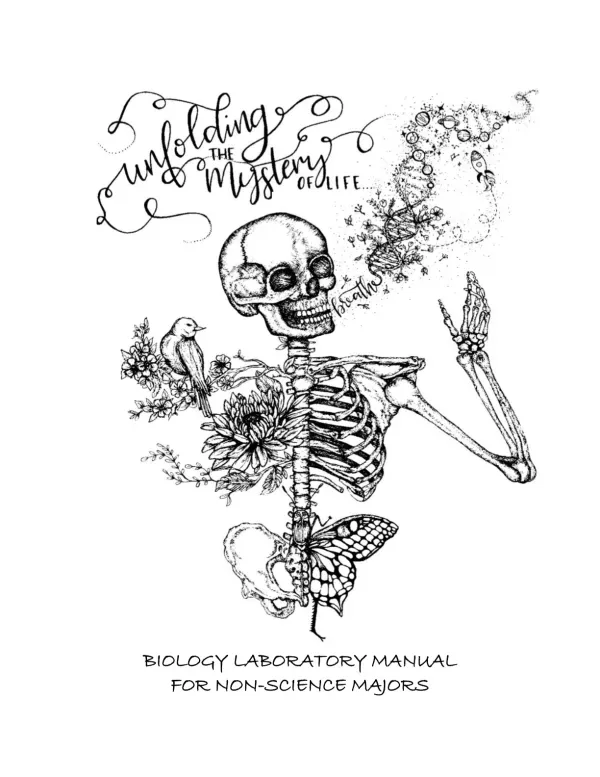
Biology Laboratory Manual for Non-Science Majors
Document information
| Author | Ellen Genovesi |
| School | Mercer County Community College |
| Major | Non-Science Majors |
| Year of publication | 2019 |
| Place | West Windsor NJ |
| Document type | laboratory manual |
| Language | English |
| Number of pages | 110 |
| Format | |
| Size | 1.65 MB |
- Biology Laboratory
- Safety Procedures
- Scientific Method
Summary
I. Safety Precautions
Safety is paramount in any laboratory setting. The Biology Laboratory Manual for Non-Science Majors emphasizes the importance of adhering to safety protocols. Students are instructed to avoid being late for class, as this can lead to missing critical instructions. Eating or drinking in the laboratory is strictly prohibited to prevent contamination and accidents. The manual outlines specific disposal methods for laboratory materials, including the use of biohazard bags and sharps containers. It is essential to familiarize oneself with the location of safety equipment such as fire extinguishers and eye wash stations. Reporting spills and unsafe conditions to the instructor is crucial for maintaining a safe environment. The manual concludes with a reminder to keep work areas organized and to wash hands before leaving the laboratory. These precautions not only protect students but also foster a culture of safety and responsibility in scientific practices.
1.1 Importance of Safety Procedures
The manual highlights that understanding safety procedures is vital for all students. It states, "I understand all of the safety procedures and information presented and I have been given an opportunity to ask questions concerning this safety information." This acknowledgment reinforces the necessity of being informed and prepared. The emphasis on safety procedures serves as a foundation for students, ensuring they are equipped to handle laboratory environments responsibly. By instilling these values, the manual prepares students for future scientific endeavors, where safety is a critical component.
II. Laboratory Skills Development
The Biology Laboratory Manual for Non-Science Majors is designed to enhance students' laboratory skills. It provides a structured approach to learning essential techniques such as data gathering, measurement, and hypothesis testing. Each exercise is crafted to build foundational skills necessary for scientific inquiry. For instance, the manual covers the metric system, which is crucial for accurate measurements in experiments. Understanding units of measurement, such as grams and liters, is fundamental for conducting experiments and analyzing results. The manual also emphasizes the importance of critical thinking and analysis, encouraging students to engage deeply with the material. By working with both living and preserved specimens, students gain hands-on experience that is invaluable in the field of biology.
2.1 Application of Laboratory Techniques
The manual outlines various exercises that allow students to apply laboratory techniques in practical scenarios. For example, exercises on microscopy teach students how to use microscopes effectively, focusing on parts, care, and total magnification. This hands-on experience is essential for understanding biological concepts at a cellular level. Additionally, the manual includes exercises on the scientific method, reinforcing the importance of experimental design and data analysis. These skills are not only applicable in academic settings but also in real-world scientific research, making the manual a valuable resource for non-science majors.
III. Understanding Biological Concepts
The Biology Laboratory Manual for Non-Science Majors serves as a gateway to understanding complex biological concepts. It covers a range of topics, including cell membrane biology, biomolecules, and human genetics. Each section is designed to break down intricate ideas into manageable parts, making them accessible to students without a strong science background. For instance, the manual explains diffusion and osmosis in a straightforward manner, allowing students to grasp these fundamental processes. The inclusion of exercises related to human genetics and cytogenetics further enriches the learning experience, providing insights into heredity and genetic variation. By engaging with these topics, students develop a broader understanding of biology and its relevance to everyday life.
3.1 Relevance of Biological Knowledge
Understanding biological concepts is crucial for non-science majors, as it fosters informed decision-making in various aspects of life. The manual emphasizes the significance of genetics in understanding health and disease, which is increasingly relevant in today's society. By learning about these concepts, students are better equipped to engage in discussions about health, environmental issues, and scientific advancements. The manual not only educates but also empowers students to apply their knowledge in real-world contexts, highlighting the practical applications of biological science.
Document reference
- Biology Laboratory Manual for Non-Science Majors (Ellen Genovesi, Laura Blinderman & Patrick Natale)
- The Metric System of Measurement
- Microscopy
- The Scientific Method
- Cell Membrane Biology
